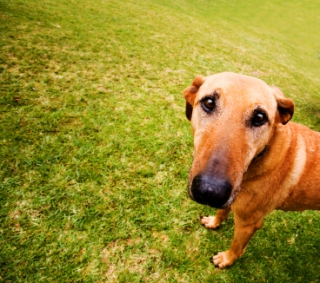Debarking Debacle

Last week I was summoned to the Massachusetts State House to express my opinion and that of the Humane Society Veterinary Medical Association regarding devocalization of dogs (and cats) for the owners’ convenience. A House bill was pending that would ban this inhumane practice but there were advocates of the procedure there in force (including the MVMA and a breeder known as Cruella Debark, who devocalizes all her dogs).
My main points were that barking by dogs is a normal, natural canine behavior. If you don’t like a dog that barks, get a cat. Also, that barking is a means of communication for dogs and has many different meanings that should be understood and dealt with. Dogs bark because their environment is deprived, because they have inadequate exercise, because they are untrained and because they have issues, like separation anxiety.
All of these reasons can and should be addressed, not surgically silenced. I mentioned two “fixes” to exemplify my points. One was the Ian Dunbar method of cutting down barking by feeding kibble exclusively from a tightly packed, semi-frozen Kong. The other was a program for treating separation anxiety that works in 95% of cases within 90 days.
I did not address the surgical procedure itself or the pain aspects, other than brief mention, as we had a board certified veterinary surgeon testifying to that effect. A shelter expert also testified to say that there are plenty of open spaces in shelters in Massachusetts and that placing a non-aggressive dog is relatively easy (so surrender of refractory barkers is not a death sentence).
I am not sure what the House will decide. We have to wait a few weeks for the final ruling but I sure hope we got through to them. It is time for cosmetic and convenience surgeries to be banned in the US, as they are in other civilized countries. I attach the written statement I sent at the State’s request prior to my testimony.
Support for An Act Prohibiting Devocalization of Dogs and Cats
As an animal behaviorist and former veterinary anesthesiologist, I am writing to express my strong opposition to devocalization performed for nonmedical purposes. Dogs bark and cats meow; that’s what they do. There is always a reason that should be understood and addressed. Surgery is not the answer and furthermore, it is inhumane.
Whether vocal cord tissue is removed totally or partially (snipped, punched or notched), through an incision in the larynx or via the oral cavity, surgery anywhere around the larynx subjects the patient to serious risks. They include reaction to anesthesia, which can result in organ failure or death, and a heightened risk of infection due to resident bacteria in the larynx and trachea.
This is not a benign procedure; removing soft tissue from the back of the throat is a extremely painful, as anyone who has had a tonsillectomy of surgical resection of the epiglottis can testify. Many times, an animal has to be re-operated on as a result of tissue re-growth (“webbing”), re-exposing them to the same risks and pain.
Post-operative monitoring and restriction of normal activity are critical after devocalization surgery. Non-compliance can result in serious, even fatal, complications, including hemorrhage and the animal choking to death.
People should do research before they buy or adopt a dog or cat whose genetic disposition is to vocalize excessively, and select another breed if noise is not tolerated. They must also recognize that pack behavior intensifies barking, so keeping many dogs when neighbors are close invites complaints. In all other cases, there is a humane behavioral solution. Passage of this bill will encourage pet owners to follow a responsible path rather than pursue convenience surgery, which treats only the symptom, never the underlying problem.
Respectfully,
Nicholas Dodman, BVMS, MRCVS, DVA, Diplomate of the American College of Veterinary Behaviorists and Diplomate of the American College of Veterinary Anesthesiologists




